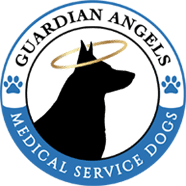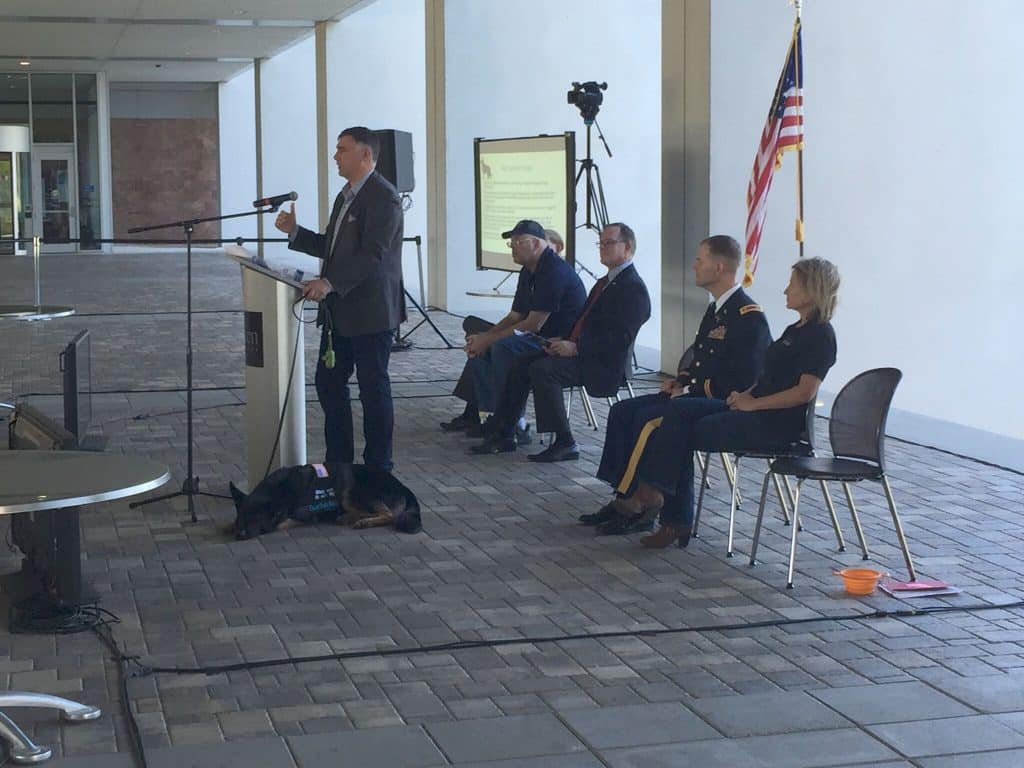Throughout generations, people have worked with dogs in various capacities. After World War I, thousands of German soldiers were blinded by mustard gas due to the multiple perils of war. During this time, it was realized that dogs could be taught to assist the soldiers. Upon this discovery, thousands of German Shepherds were entered into an extensive program where they were trained to become guide dogs to lead people who are blind.
In 1929, the first service dog, a German Shepherd trained as a guide dog, entered the United States. He was imported by a visually impaired man named Morris Frank. The first guide dog foundation started in 1945, where dogs were trained as guide dogs for people who are blind. In the sixties and seventies people began to realize that dogs could alert to a variety of issues, thus assisting people with other disabilities. Whether it was a baby crying from another room that they couldn’t hear or alerting in advance to someone who was having a seizure, people began to see the incredible things dogs could do.
Before this, people who owned or interacted with dogs often just thought the dog was bothering them rather than alerting them to something. In many cases, dogs were not kept inside the home, so they had little chance to experience these situations and alert humans to them. More work had been done with service dogs, spurring the founding of the first service dog organization in the mid 1970’s.
The Evolution of Federal Service Dog Laws
The first federal law involving service dogs was enacted under the American Disabilities Act, which protected service dogs and their recipients. Unfortunately, when this law was written, they used “service animals” and did not define a service animal.
As the use of technology grew, people began to abuse this law. People were going online to purchase fake service dog vests, I.D. cards, and fake letters to take their pets into public places where a true service dog could go. Fake service animals can lead to several issues for service dogs and are highly problematic for recipients who rely on their service dogs for their daily tasks that allow them to lead a more normal life.
With our dogs at Guardian Angels Medical Service Dogs, we have had many episodes of inappropriate dogs attacking our service dogs. Our dogs are trained to ignore outside distractions, including other dogs and animals, while working and caring for their recipients. A service dog being attacked by an inappropriate dog can cause a myriad of issues for that service dog team. It can lead to the service dog becoming defensive in the future, causing them to potentially lunge or bark at other dogs in public, which is not proper behavior for a service dog. This can cause a good working dog to be prematurely retired if the issue is severe enough.
In 2012, the government recognized the issues occurring with fake service animals due to the vague language of the former law. The law was changed to specifically name service animals as dogs and miniature horses where appropriate, that are trained to do specific tasks to mitigate the challenges of an individual’s disability. Today, these are the only animals recognized as service animals under federal law.
Congressional Initiative to Improve Service Dog Training
Over the years, multiple non-profit organizations that train service dogs have created a coalition that has set forth minimum standards that others who are training service dogs should aspire to meet. We have consistently met and exceeded these standards at Guardian Angels Medical Service Dogs.
Throughout our years of training and pairing service dogs, we have developed sophisticated programs that allow us to do more for our dogs and recipients. These many innovative programs have advanced us dramatically within the industry.
Recently, the U.S. Congress mandated an initiative to study 110 1`protocols to continue improving the service dog industry and set the gold bar for everyone to follow.
With this initiative, Congress wants to explore the variables that go into raising, training, and pairing service dogs with veterans. This initiative is directed by Danny Benbassat, Ph.D., Commander, U.S. Public Health Service, CofS, Assistant Professor, Department of Physical Medicine & Rehabilitation, and managed by the Medical Technology Enterprise Consortium OTA and acting Wounded Warrior Service Dog Program integrator Jeremy Ramirez, DrPH, MPH, Veteran, U.S. Army, Assistant Professor of Health Informatics, California State University Long Beach Department of Health Care Administration.
Twenty-four service dog organizations, including Guardian Angels Medical Service Dogs, were chosen to participate in this initiative. Our organization is honored to be selected to provide our input on this initiative. We work hard to ensure that we take the correct measures for our service dogs and recipients while exploring new ways to meet their needs, allowing us to create sophisticated programs that positively change and even save lives every day.
This Congressional initiative aims to discover what we and the other organizations believe are the best practices to put in place. At the end of July, Guardian Angels Medical Service Dogs will come together in Washington, D.C., with the other organizations chosen for this initiative. At this meeting, they will discuss the findings they have been notating through the exploration of the numerous variables that were set forth. We were practicing most of these protocols with our service dogs already. We are helping to determine what works, what doesn’t, and what modifications need to be made for the entire set of initiatives.
This meeting will allow the organizations to collaborate and discuss their findings in detail and create a final document of expert guidelines, which will then be delivered to Congress. An intermediate person will directly address Congress with these findings. With this initiative, Guardian Angels Medical Service Dogs and other participating organizations hope to set the gold standard for the entire service dog industry.
Hopes for the Future of the Service Dog Industry
At Guardian Angels Medical Service Dogs, we hope this Congressional Initiative sparks further change and improvement within the service dog industry, leading to more funding for service dog organizations that provide these amazing dogs for veterans in need. The final decisions on these initiatives will further improve the training and best practices that each service dog organization follows.
We plan to continue year after year to explore other portions of the service dog industry and determine what upgrades and changes need to be implemented to ensure veterans and civilians in need of a service dog receive their life changing, life saving service dog.
- History of Service Dogs and Current Laws - February 23, 2024
- Guardian Angels Medical Service Dogs launches Puppy Love Campaign - February 14, 2022





